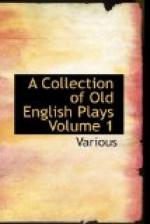[111] These four lines are from the old ballad of Fortune my foe, which will be found printed entire in the Bagford Ballads (Ed. J.W. Ebsworth, part iv. pp. 962-3); the music is given in Mr. W. Chappell’s Popular Music of the Olden Time, I. 162. Mr. Ebsworth writes me:— “I have ascertained (assuredly) that what I at first thought to be a reference to ‘Fortune my foe’ in the Stationers’ Registers, 1565-66, entered to John Charlewood (Arber’s Transcripts, l. 310), as ’of one complaining of ye mutabilitie of Fortune’ is not ‘Fortune my foe,’ but one of Lempill’s ballads, printed by R. Lekpriwicke (sic), and still extant in the Huth Collections—the true title being ’Ane Complaint vpon Fortoun;’ beginning ‘Inconstant world, fragill and friuolus.’”
[112] Nares quotes from Chapman’s May Day, “Lord, how you roll in your rope-ripe terms.” Minshew explains the word as “one ripe for a rope, or for whom the gallows groans.” I find the expression “to rowle in their ropripe termes” in William Bullein’s rare and curious “Dialogue both pleasaunt and pietiful,” 1573, p. 116.
[113] A very common term for a pimp.
[114] “Bale of dice”—a pair of dice; the expression occurs in the New Inn, I. 3, &c.
[115] This song is set to music in an old collection by Ravenscroft, 1614.
[116] More usually written “mammets,” i.e., puppets (Rom. & Jul. iii. 5; though, no doubt, in Hen. IV., ii. 3, Gifford was right in connecting the word with Lat. mamma).
[117] Cf. Drayton’s Fairy Wedding:—
“Besides he’s
deft and wondrous airy,
And of the noblest of the
fairy!
Chiefe of the Crickets of
much fame
In fairy a most ancient name.”
So in Merry Wives, v. 5, l. 47.
[118] Quy. What kind o’ God, &c.
[119] “There is a kind of crab-tree also or wilding that in like manner beareth twice a yeare.” Holland’s Plinie, b. xvi.
[120] “Assoyle” usually = absolve; here resolve, explain.
[121] The italics are my own, as I suppose that the four lines were intended to be sung.
[122] 4to. It is, it is not, &c.
[123] The sense of “fine, rare,” rather than that of “frequent, abundant” (as Nares explains), would seem to suit the passages in Shakespeare and elsewhere where the word is used colloquially.
[124] “Sib” = akin. Possibly the word still lingers in the North Country: Sir Walter Scott uses it in the Antiquary, &c.
[125] “Wonning” sc. dwelling (Germ. wohnen). Spenser frequently uses the word.
[126] A Spenserian passage (as Mr. Collier has pointed out): vid. F.Q., B. 2. C. xii. 71.
[127] 4to. then.
[128] 4to. And here she woman.
[129] “Caul” = part of a lady’s head-dress: “reticulum crinale vel retiolum,” Withals’ Dictionarie, 1608 (quoted by Nares).




